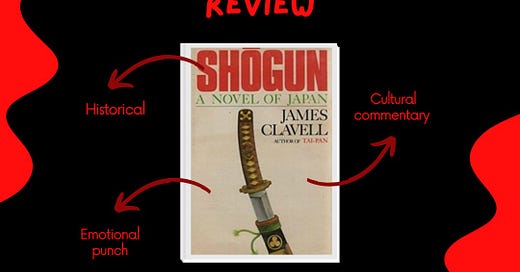Shogun - A review of Clavell's masterpiece
What a fantastic novel. Top of the year so far for me.
Where do I begin with this?
Shogun was, and is, a masterpiece.
But I have had a hard time truly delving into why. At least, in my mind. So I figured I’d write it out. Like some, my thoughts organise themselves better when I simply write or type.
LANGUAGE
I wouldn’t say Clavell writes in a manner that is flowing prose. There is beauty in his writing, that is certain, but not in the style in which I’d expect to respect. There is a sense of simplicity in his descriptions of the setting and characters. This, inherently, makes his writing incredibly digestible. An important characteristic for a 1000+ page novel. And it is in this simplicity, where the reader’s mind is able to fill the void with their own vivid imagination, that this simplicity comes alive.
I found his language a breath of fresh air. Not the overpowering, heavy descriptions that I (and many others) inevitably write in. It allowed me to focus more on his character development, which leads me to my next point.
CHARACTERS
This is the true power of Clavell’s work. His characters are rich, deeply flawed and all offer an exquisite taste of the human spirit - that dichotomy of good and evil which fills us all.
Clavell’s characters are simply out, human. At one point during my reading, I believe I hated each and every character for an action or a word they said. I also inevitably respected and loved each character at some point too.
Take Omi, for example. He is absolutely despicable in the opening few chapters, yet I grew to truly respect his genius and cunning throughout the novel.
Blackthorne, the protagonist, is such an excellent character. It was impossible not to root for him.
Toranaga, the major ally for Blackthorne, rivals even Tyrion and Tywin Lannister from. George Martin’s A Song of Ice and Fire, in his political genius, manipulation, and strong leadership style.
As much as I loved the latter two, and they were close to vying for my favourite character, Mariko pips them both.
She is the strongest, female character I have seen written. Feminine and clearly written to be a love interest for Blackthorne, yet filled with a deep level of honour, dignity, zeal and passion. She is truly a symbol for how strong women should be written. Powerful in her femininity.
But I found myself asking, how is it he has crafted such fantastic characters? And the answer is simple - Clavell is a master of dialogue and the craft. This is something I am truly jealous of, and had to respect. As someone who has always struggled to write dialogue, Clavell’s work has opened my eyes to the possibilities.
PLOT AND PACING
I think a lot of people who have read this novel will agree with me here, that there is a certain level of disappointment that comes from the ending. But the more I sit and think and meditate on it, the more I realise the ending I was after was, not only absolutely not necessary, but would have destroyed the whole novel and its focus. I would have liked to see the war in full swing. But that is clearly not the purpose of the text.
The plot itself is compelling. Manipulation. Distortion. Corruption. Class systems and religious feuds and nationalist ideologies that break against one another like waves on rocks. It makes the reading enjoyable. And pushed me, as a reader, to yearn to see what happened next.
This aided the slow pacing of the novel. I’ll admit, I found the opening chapter or two so slow I almost put it down. But I am a sucker and trapped in my own ego, that I will never (or very rarely) stop reading a book. I simply have to finish them. And whilst this has caused me a lot of pain (Still Life by Louise Penny comes to mind) it allows me to persevere through books such as Shogun, that inevitably become favourites of mine.
If you can put up with slow paced work, that delivers excellent reward, then this is for you.
FINAL THOUGHTS
This is a novel that has depth to it, if you are willing to really ponder and think about it. It opened my eyes to perspectives of civility and what different cultures perceive as civilised behaviour. Through the lens of Blackthorne, the English navigator, I found myself contemplating these differences in culture. Bathing and cleanliness, versus the sanctity of human life, versus class and caste systems, versus honour, family, manners and respect. It truly is a wonderful read in this respect, and as someone who has visited Japan and has a bit of background knowledge on their cultural practices, I found this so intriguing to watch it play out.
5/5 for me. An excellent read. Please, do yourself a favour.




